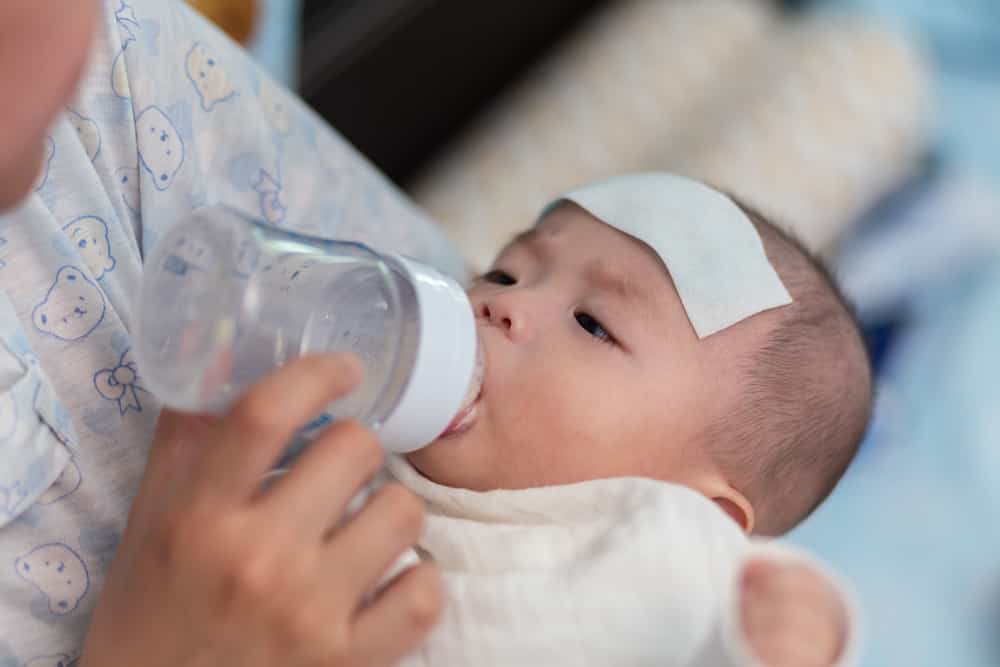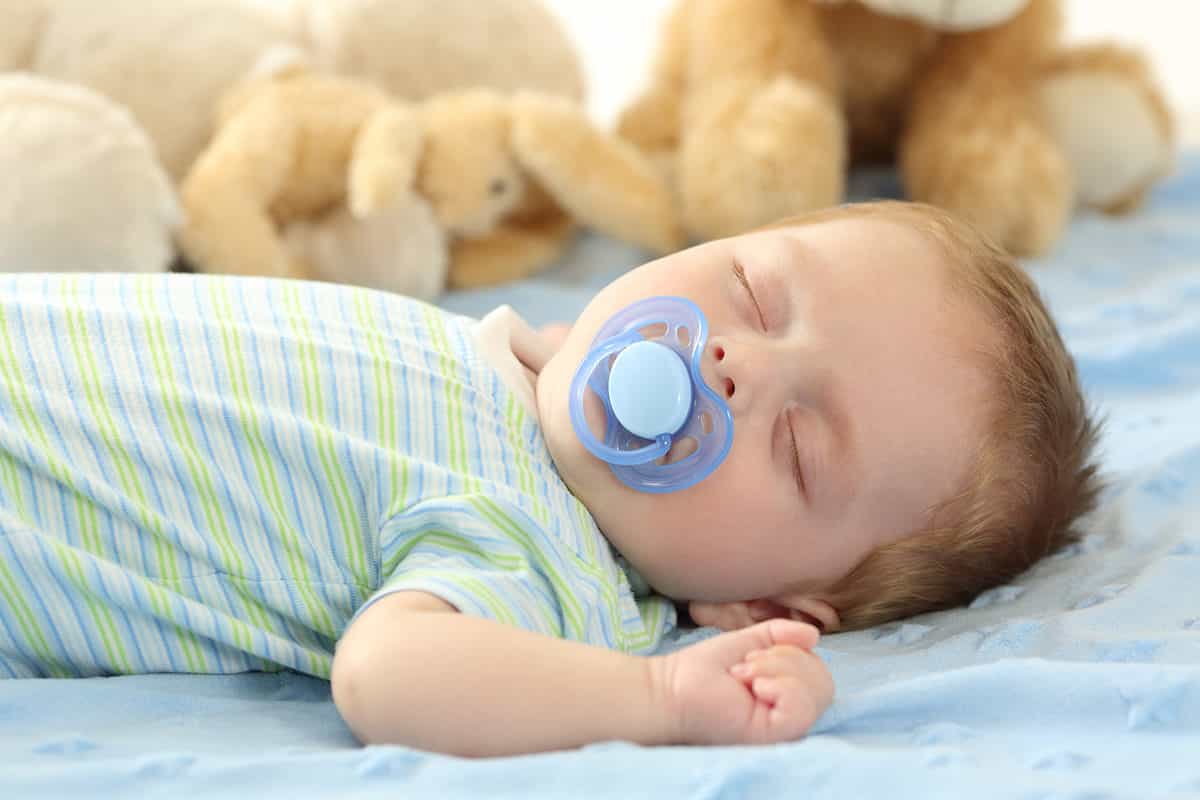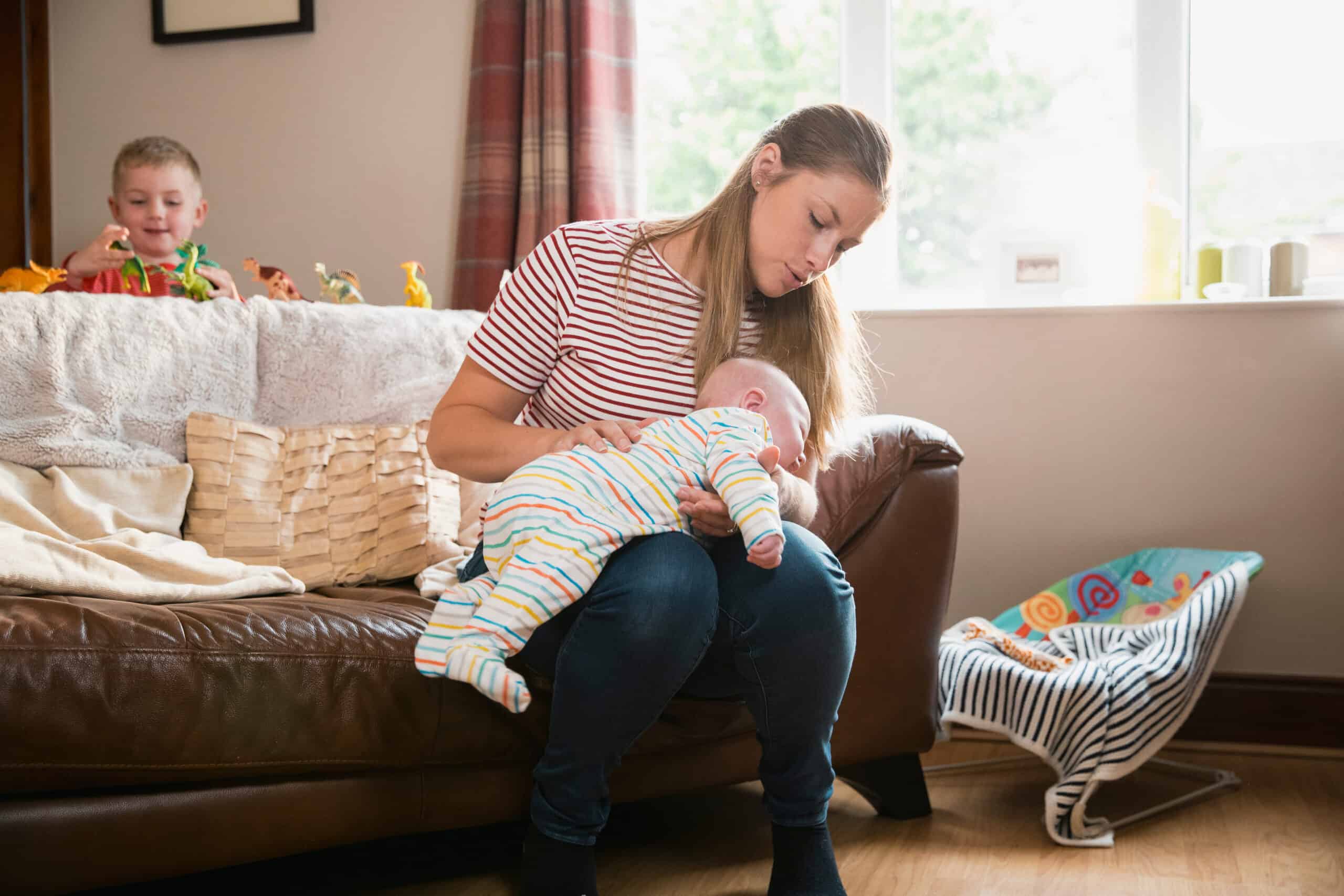It is not uncommon for new parents to become a bit startled when their baby starts to hiccup and won’t stop. In most cases, the act is harmless, with a few exceptions. While many doctors will just recommend that you let it pass, if it doesn't seem to end, then there are some steps you can take. Today, we will talk about this phenomenon and the steps that you can take to stop baby hiccups if things get out of hand.
Key Points
- While scientists are unsure as to the cause of hiccups, some things can make them more likely. Overfeeding your baby or feeding them too quickly can bring about hiccups.
- Acid reflux can also contribute to frequent hiccups.
- Hiccups will go away on their own after a while, but if they're lasting for a long time or they're getting on your nerves, there's a few things you can do to help stop them.
What are Hiccups, and When Should I Be Concerned?

Overfeeding your baby can be a cause of hiccups.
©Alen thien/Shutterstock.com
For starters, it is important to know that your baby has no control over their hiccups, and there is nothing that you can do to cause them to get the hiccups. Instead, a hiccup is simply a spasm of the diaphragm that runs across the rib cage that moves up and down as we breathe.
In reality, there isn’t a solid scientific reason for hiccups. However, there are certain eating habits that can increase the likelihood of experiencing hiccups, including:
- Overfeeding the baby
- Feeding baby too quickly.
- Swallowing a lot of air while eating.
Whatever the reason, when the stomach distends, it will push against the baby’s diaphragm, causing a spasm. When that happens repeatedly, you hear the repeated hiccups.
Experts also say that hiccups can occur due to a change in stomach temperature. So, if you give your baby a bottle of cold milk and soon after they eat warm rice, it could cause them to get hiccups.
Acid Reflux and When You May Be Concerned
The sensation can also happen when food and acid rise up in the baby’s body when they are full. It is sort of a defense mechanism against acid reflux. While many of us feel some type of acid reflux, many babies can also experience gastroesophageal reflux. This is when acidic juices and partially digested food from the stomach flow back up into the esophagus. The esophagus passes through the diaphragm, and once irritated, it can lead to hiccups.
If your baby continues to have acid reflux issues, then you can modify their diet or contact the pediatrician. Signs of potential acid reflux include:
- Baby is spitting up more frequently than normal.
- Your baby is crying more frequently, especially after meals.
- The baby arches their back a lot during and after feedings.
Why You May Want to Stop Baby Hiccups
In most cases, you can let your baby get through their hiccups, and it won’t hurt them. A baby can have hiccups multiple times per day, and an episode can last 10 minutes or so. According to doctors, in most cases, it is okay to let your child get through their hiccups.
If your baby starts to look uncomfortable with the constant hiccups, then you may want to intervene. This is especially true if you are about to lay them down for their nap. While hiccups won’t disrupt your baby’s sleeping, they can be irritating enough to keep them awake. So if naptime is coming up and you value peace and quiet, then you may want to find a way to stop baby hiccups.
Six Tactics to Stop Baby Hiccups

Giving your baby a pacifier can help with hiccups.
©iStock.com/AntonioGuillem
There are several strategies that you can use to help your baby get past their hiccups. The resolution will often depend on if your baby is breastfed or bottle-fed. But most of these tips will work either way.
1. Change How You Feed Your Baby
Babies often hiccup during feedings, so if you want to stop baby hiccups, then you may need to modify how you feed your child.
Breastfed Babies
If you breastfeed your baby, then you must take steps to ensure that you are not going overboard with the feeding. Burp your baby as you switch them from breast to breast.
In the case that your baby hiccups often during breastfeeding sessions, then you may need to reevaluate the latch. Ensure that the baby’s mouth is sealed around the entire areola of the breast.
Bottle-Fed Babies
In order to prevent hiccups, try stopping halfway through a bottle so you can burp your baby and take a break for 5-10 minutes before they resume feeding. That way, they will be relaxed, and they may not hiccup.
Just like with breastfeeding, you may need to eliminate unnecessary air, so try repositioning the bottle, so the air is at the bottom, not towards the nipple.
2. Take A Few Moments After the Feeding
Once you are done feeding your baby with the breast or the bottle, the best way to prevent hiccups is to take a few minutes and hold your baby upright for a few minutes. Just hold them up at a 30- to 45-degree angle so that the air doesn’t settle in their stomach and cause the contraction of the diaphragm. You can also hold the baby up while feeding to further eliminate the possibility of hiccups after the fact.
3. Give Your Baby a Pacifier
If, after the baby is done feeding, they are still experiencing hiccups and you want to help, consider giving them a pacifier. The idea is that the sucking motion will soothe them so they can relax, and the hiccups can stop. It doesn’t have to be a special pacifier. Any pacifier will work.
4. Consider Gripe Water
Typically recommended for when your baby has an upset tummy, gripe water can also help with hiccups. You don’t need to give much. Less than a spoonful will do. Gripe water is a natural combination of fennel, ginger, and chamomile, and it works wonders to ease hiccups.
5. Burp or Rub Baby’s Back
Since hiccups are about air and bubbles, you can do a lot to soothe your baby’s hiccups by patting them on the back. Don’t go crazy. Typically, a few gentle pats will do. You can also rub your baby’s back to help with the issue. Focus on gentle, circular motions to put the baby at ease.
6. Wait It Out
You can try any of the methods mentioned above, but remember that you don’t have to do any of them. Typically, the best thing to do is to wait out the 10 minutes until the hiccups pass. Remember that there is typically nothing wrong with hiccups, and knowing that can take a lot of the worry out of the situation.
When to See a Pediatrician
If your baby only has occasional hiccups or hiccups a few times a week, it is not a cause for concern or worth the time to drive to see the pediatrician. However, if your baby frequently has hiccups like clockwork and nothing you do helps, then it may be linked to acid reflux. That may be a time that you bring the baby in to be checked out. A doctor will be able to remedy the situation.
What Not To Do
Although many parents may want to put their baby at ease, it is important not to take the wrong steps when you are trying to stop baby hiccups. With that said, don’t do the following:
- Don’t try to startle them. It is a fallacy that scaring someone will get rid of hiccups. Plus, a young baby’s neurological systems are still developing, so they may get more scared than necessary.
- Many people also try the trick of pulling on the baby’s tongue while pressing on their forehead. Again, this is not a proven medical treatment and it may cause more harm than good.
- Giving your baby water is typically frowned upon and can be dangerous, especially for babies under 6 months old that should only be drinking breast milk or formula. Plus, the method doesn’t work.
- Don't ever shake your baby or pound on their back/chest to try to relieve hiccups. Shaken baby syndrome is extremely dangerous and can easily cause permanent brain damage or death.
- One tactic that many people claim helps with hiccups is to eat certain foods. This is a myth. Only feed your baby what you'd normally give them; don't change their diet on account of hiccups unless directed to by a doctor.
Conclusion
So there you have it. Six steps to try and stop baby hiccups. Once again, it is important to remember that, generally, hiccups are not dangerous for your child. It's a basic part of life that your baby will always have to deal with. However, these simple tips can help your baby to get past their little episode. Remember: don't buy into the many urban legends about getting rid of hiccups.
The image featured at the top of this post is ©DGLimages/Shutterstock.com
